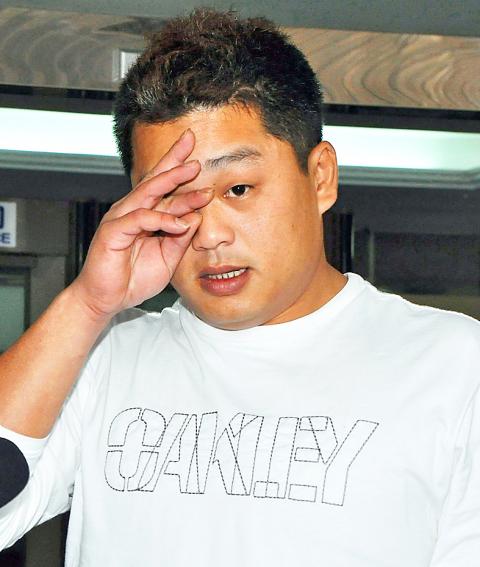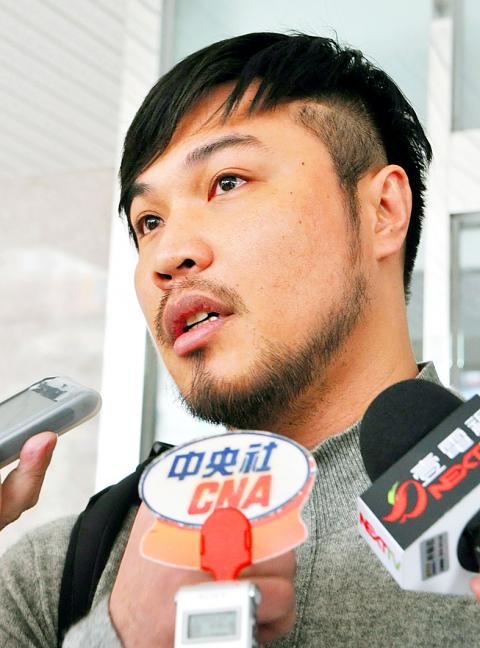Several star baseball players, gang members and former Chinese Nationalist Party (KMT) Tainan County Council speaker Wu Chien-pao (吳健保) were yesterday found guilty of having played a part in the match-fixing scandal that rocked the domestic league in 2009, but critics said the punishments they have received do not fit their crimes.
The Taiwan High Court yesterday announced that it has determined that the defendants conspired to fix Chinese Professional Baseball League games by colluding with various illegal gambling syndicates, starting from the 2006 season.
Of the 35 players charged in 2010 in the case, three high-profile figures were found guilty yesterday: former Brother Elephants power hitters Chen Chih-yuan (陳致遠) and Tsai Fong-an (蔡豐安), and former La New Bears ace pitcher Chang Chih-chia (張誌家).

Photo: CNA
The High Court’s ruling reduced the trio’s original jail terms from one to two-and-a-half years, to between four and six months. Chen and Tsai can commute their jail terms by paying a fine of NT$162,000 (US$5,400) each, while Chang can do so with a NT$120,000 payment.
The 2009 game-fixing scandal was the fifth to have erupted in the league and is known as the “Windshield Wiper” (雨刷) baseball scandal because Tsai Cheng-yi (蔡政宜), the alleged mastermind behind the main gambling syndicate, is nicknamed “The Windshield Wiper.”
Tsai Cheng-yi got a jail sentence of three years and eight months in yesterday’s verdict, which cannot be commuted to a fine.

Photo: CNA
In the ruling, the court also found Wu guilty of financing Tsai Cheng-yi and his “Windshield Wiper” gambling syndicate and sentenced the former council speaker to three years and two months in jail.
Another key figure named in the ruling is Brother Elephants pitcher Chuang Yu-lin (莊侑霖), who the court says was the gambling syndicates’ main contact. He received a three-year term that can be commuted to a fine.
Tseng Han-chou (曾漢州), former slugger for the Chinatrust Whales, was also found guilty and, in addition to his original one-year jail sentence, received a separate one-year and 10-month term that can be commuted through paying fines.
The High Court’s ruling drew condemnation from sports circles, fans and experts yesterday, who said the light sentences are detrimental to the sport’s development because the guilty players have gotten away with committing major criminal offenses without having to serve prison sentences.
CPBL deputy secretary-general Wang Hui-min (王惠民) expressed regret over the verdicts on behalf of the league.
“We are worried that the sentencing will not deter other players from undertaking such actions in the future and thus damage pro baseball in Taiwan,” he said.
“This ruling shows that the presiding judges do not understand professional baseball very well. It also shows that they do not appreciate the serious harm this scandal has inflicted on the sport and on society,” Wang said.
Chinatrust Brothers manager and former CPBL secretary-general Wayne Lee (李文彬) said he was disappointed with the verdict, adding that he is concerned that criminal syndicates will once again try to infiltrate the nation’s ballparks to entice players to throw games.
The “Windshield Wiper” scandal broke in 2009, when a judicial probe was launched a day after the finale of the CPBL championship series in October.
Before the scandal broke, Chen, Tsai Fong-an and Chang were popular players, as well as members of the national squad at the 2004 Olympic Games in Athens.
Chang was a starting pitching for Japan’s Seibu Lions from 2002 to 2006, before getting released and returning to Taiwan in 2008.
“Our society must revamp baseball in the education system,” baseball broadcaster and former national team player Yang Ching-lung (楊清瓏) said. “The student players are focused only on athletics, and we neglect their proper education in ethics and morality. Some baseball players do not understand that they must keep clean and refrain from bribes and criminal activities.”

DAREDEVIL: Honnold said it had always been a dream of his to climb Taipei 101, while a Netflix producer said the skyscraper was ‘a real icon of this country’ US climber Alex Honnold yesterday took on Taiwan’s tallest building, becoming the first person to scale Taipei 101 without a rope, harness or safety net. Hundreds of spectators gathered at the base of the 101-story skyscraper to watch Honnold, 40, embark on his daredevil feat, which was also broadcast live on Netflix. Dressed in a red T-shirt and yellow custom-made climbing shoes, Honnold swiftly moved up the southeast face of the glass and steel building. At one point, he stepped onto a platform midway up to wave down at fans and onlookers who were taking photos. People watching from inside

A Vietnamese migrant worker yesterday won NT$12 million (US$379,627) on a Lunar New Year scratch card in Kaohsiung as part of Taiwan Lottery Co’s (台灣彩券) “NT$12 Million Grand Fortune” (1200萬大吉利) game. The man was the first top-prize winner of the new game launched on Jan. 6 to mark the Lunar New Year. Three Vietnamese migrant workers visited a Taiwan Lottery shop on Xinyue Street in Kaohsiung’s Gangshan District (崗山), a store representative said. The player bought multiple tickets and, after winning nothing, held the final lottery ticket in one hand and rubbed the store’s statue of the Maitreya Buddha’s belly with the other,

‘NATO-PLUS’: ‘Our strategic partners in the Indo-Pacific are facing increasing aggression by the Chinese Communist Party,’ US Representative Rob Wittman said The US House of Representatives on Monday released its version of the Consolidated Appropriations Act, which includes US$1.15 billion to support security cooperation with Taiwan. The omnibus act, covering US$1.2 trillion of spending, allocates US$1 billion for the Taiwan Security Cooperation Initiative, as well as US$150 million for the replacement of defense articles and reimbursement of defense services provided to Taiwan. The fund allocations were based on the US National Defense Authorization Act for fiscal 2026 that was passed by the US Congress last month and authorized up to US$1 billion to the US Defense Security Cooperation Agency in support of the

‘COMMITTED TO DETERRENCE’: Washington would stand by its allies, but it can only help as much as countries help themselves, Raymond Greene said The US is committed to deterrence in the first island chain, but it should not bear the burden alone, as “freedom is not free,” American Institute in Taiwan Director Raymond Greene said in a speech at the Institute for National Defense and Security Research’s “Strengthening Resilience: Defense as the Engine of Development” seminar in Taipei yesterday. In the speech, titled “Investing Together and a Secure and Prosperous Future,” Greene highlighted the contributions of US President Donald Trump’s administration to Taiwan’s defense efforts, including the establishment of supply chains for drones and autonomous systems, offers of security assistance and the expansion of